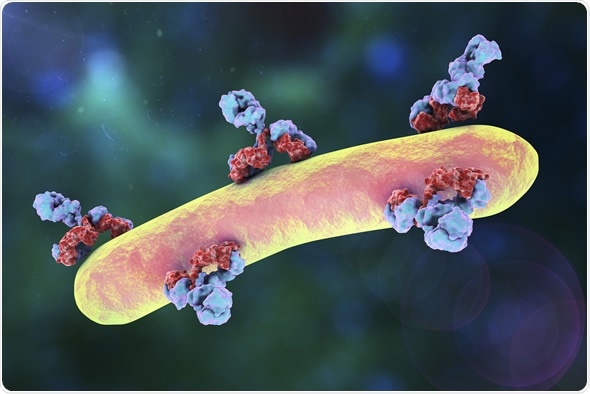Antibodies are proteins that can bind to specific molecules called antigens. They have different portions in their Y-shaped structure that can bind to antigens and effector molecules. Several types of antibodies such as primary and secondary and monoclonal and polyclonal antibodies with varying specificities have been developed in recent years. These developments have made antibodies indispensable components in a plethora of applications in medicine and biomedical research.

Image Copyright: Kateryna Kon, Image ID: 391612111 via Shutterstock.com
Applications of antibodies
Some important applications of antibodies in medicine and biomedical research are discussed below:
Medicine
Diagnosis
- Antibodies are highly useful in medical diagnostics. Many biochemical assays enable the detection of specific antibodies for the diagnosis of diseases.
- Most immunodiagnostic techniques such as ELISA use multiple antibodies to detect specific antigens capable of causing infectious diseases
- In clinical immunology, levels of different classes of immunoglobulins are helpful in analyzing a patient’s antibody profile.
- An increase in certain immunoglobulins is also a useful indicator in the diagnosis of many ailments. e.g., the elevation of IgM is an indication of viral hepatitis
- Antibodies that can bind to human chorionic gonadotropin are used in over the counter pregnancy test kits.
Therapy
- Antibodies are used to treat immune deficiencies such as hypogammaglobulinemia. Here, ready-made antibodies are administered to the patient to induce passive immunity.
- Monoclonal antibodies are widely used to treat several diseases such as multiple sclerosis, rheumatoid arthritis, psoriasis, and several different cancers including colorectal cancer and breast cancer. About a dozen monoclonal antibodies for cancer treatment have been approved by the US Food and Drug Administration so far. Clinical trials are on for developing more monoclonal antibodies that can help treat many more types of cancer.
Prenatal therapy
Rho(D) immune globulin antibodies are used in prenatal treatment to prevent the risk for hemolytic disease of the newborn. In the case of an Rh-incompatible fetus and mother, any blood mixing may cause sensitization of Rh- mother to the Rh+ antigen from the child.
If the mother is treated with anti-RhD antibodies prior to delivery of trauma, it destroys the Rh antigen from the fetus before the antigen stimulates maternal B cells. Thus, treatment with Rho(D) immune globulin prevents sensitization that can cause Rh disease even in future pregnancies.
Biomedical research
The high specificity and sensitivity of antibodies is a true advantage in biomedical research applications. Advances in biotechnology have enabled the production of antibodies in a large scale. This section provides an overview of the applications of antibodies in biomedical research.
Western blotting
In this technique, proteins are electrophoretically separated and then transferred to a blotting paper, which is exposed to labeled antibodies to detect the proteins.
Immunosorbent assays
Enzyme-linked immunosorbent assays (ELISAs) are highly popular techniques used to detect and quantitate a particular antigen in blood serum. These assays exploit the high specificity of antibodies for different target antigens. Direct ELISAs use monoclonal antibodies to detect a specific antigen in a solution. Indirect ELISA uses a primary and secondary antibody to detect the antigen.
Immunohistochemistry/immunocytochemistry
Immunohistochemistry and immunocytochemistry are techniques used for in situ determination of the presence and the location of proteins. In these techniques, primary antibodies are used to bind to target antigens and conjugated secondary antibodies are used to detect the antigen-primary antibody complex.
Immunoprecipitation assays
In immunoprecipitation assays, antibodies help label and precipitate target antigens from an aqueous solution. Agarose beads first bind to the Fc region of the antibody and then allow centrifugal separation of the antibody-antigen complexes.
In vivo applications
In immunological studies, antibodies can be used in vivo to deplete specific cells for functional analyses. Antibodies are also in vivo for neutralization of cell surface receptors to enable binding to soluble factors.
Flow cytometry
Antibodies are widely used in flow cytometry for intracellular analysis. In this method, single-cell suspensions are surface stained with highly specific fluorochrome-tagged antibodies that can be detected easily.
Cells can also be labeled with multiple antibodies as advanced flow cytometers are capable of detecting 3 or more fluorochromes at the same time. This can help detect proteins in the cytosol, nucleus, and endosomes.
References
Further Reading